
Magnesium is very common in nature. It is 1.9 percent in the earth's crust.
The double carbonate of calcium and magnesium, dolomite, forms entire mountain ranges. Seawater contains significant amounts of magnesium salt, it is also found in plants where the sucking part is chlorophyll (hence it is called plant iron). In nature, due to its high reactivity, it is not found in free form.
Magnesium was discovered in 1808 by Sir Humphrey Davy, the name originates from the Greek city of Magnesia, where large deposits of magnesium carbonate were found. Leroy proved the essentiality of magnesium for animals in 1926, and Fink confirmed this for humans in 1954.
About magnesium in general
Magnesium is a metal of silvery luster, of medium hardness, crystallizes in a hexagonal type of lattice. It is stable at room temperature because it is protected by a thin layer of oxide. It is soluble in acids. Due to its high affinity for oxygen, it is used as a reducing agent. It is bivalent in compounds.
Natural sources of magnesium
With a proper diet, an average of about 300 mg of magnesium is ingested daily.
Natural sources are: soy, peanuts, leafy vegetables, seeds, walnuts, ban ane, oats, avocados, peeled potatoes, brown rice.
The fate of magnesium in the body
Magnesium is absorbed along the entire length of the small intestine, but only 50%. Absorption is active and passive, accelerated by vitamin O. Magnesium absorption is reduced by phytates, fiber, fats, oxalic acid, potassium, phosphorus, iron and manganese.
It is excreted in the urine, small amounts in the faeces. The kidneys are a regulator of serum concentration and total magnesium content in the body. Reabsorption takes place in the tubules, with the help of which homeostasis is maintained. Magnesium reserves are in the bones. The transport of magnesium to or from cells depends on active transport and glucose. Vitamin B6, insulin and calcitriol help the body to enter the cell.
Physiological role of magnesium in the body
- regulates calcium ion concentrations
- is a skeletal muscle relaxant
- contributes to the production of energy reserves
- regulates the contractility of the heart muscle
- relaxes smooth muscles
- helps to regularly empty the digestive tract
Magnesium is the fourth most abundant cation in the human body, with potassium being the most abundant cell cation. It is 24 g in the human body, of which more than half is in the bones. One-third of plasma magnesium is bound to albumin, 55 percent is in the ionized state, and 15 percent is in the form of complexes. Physiologically active is the ionized form of magnesium. The concentration of magnesium in the serum does not reflect the state in the organism due to the large differences between the concentrations of intracellular and extracellular space and the high content in the bones.
Magnesium is involved in more than 300 enzyme systems (Krebs cycle, glycolysis process, protein synthesis, nucleic acid synthesis).
Magnesium is important for neuromuscular stimulus transmission, bone mineralization, and the secretion and action of parathyroid hormone. It is responsible for the functioning of calcium channels and pumps in the cell membrane. Magnesium is involved in the formation and utilization of ATP, in fact, it is directly involved in the formation of energy in the human body and in coagulation, thus reducing aggregation. It is also involved in the transport of glucose into cells.
Magnesium reduces systemic and pulmonary vascular resistance, leading to a drop in pressure and a slight increase in cardiac index. Magnesium is a cofactor in two enzymes involved in lipid metabolism, lecithin cholesterol acetyltransferase and lipoprotein lipase. Magnesium prevents and reduces convulsions by blocking neuromuscular transmission and reducing secreted acetylcholine at nerve endings. Magnesium has a depressant effect on the central nervous system, but not in the mother, fetus or newborn, so it is used in preclampsia and preeclampsia (caution due to possible hyocalcemia)
Magnesium deficiency
Magnesium deficiency is relatively common due to altered eating habits of people. More and more refined food is consumed, more and more so-called soft (sweet, non-alcoholic) beverages, alcohol, coffee are consumed, large quantities of refined sugar are introduced. Magnesium deficiency is often not observed at all.
Hypomagnesaemia
Magnesium deficiency may be due to gastrointestinal disturbances (malabsorption syndrome, diarrhea, acute pancreatitis, radiation damage to the intestinal tract) or may be due to hemodialysis, diabetes, kidney damage, chronic alcoholism, use of certain diets, hormonal and metabolic disturbances. Magnesium deficiency is also accompanied by changes in calcium and potassium metabolism.
In magnesium deficiency, premature contractions of the ventricles and their fibrillation occur. Increased blood clotting may also occur, especially in already damaged blood vessels. Symptoms include: muscle tremor, weakness, swallowing disorders, nausea, vomiting, and tetany.
Magnesium toxicity
Hypermagnesemia can be caused by excessive intake (food, nutrient supplements, infusions) or decreased excretion (acute and chronic renal failure, some diuretics, decreased extracellular fluid volume). This can be caused by increased release from the cells.
Symptoms include: muscle weakness, muscle numbness, bradycardia, hypotension, respiratory depression with continued vomiting, coma, and cardiac arrest. Signs of magnesium excess occur when the concentration rises above 2 mmol / L.
Recommended daily amounts of magnesium
The recommended daily intake of magnesium for a healthy adult female is 320 mg, for a vegan adult male 420 mg.
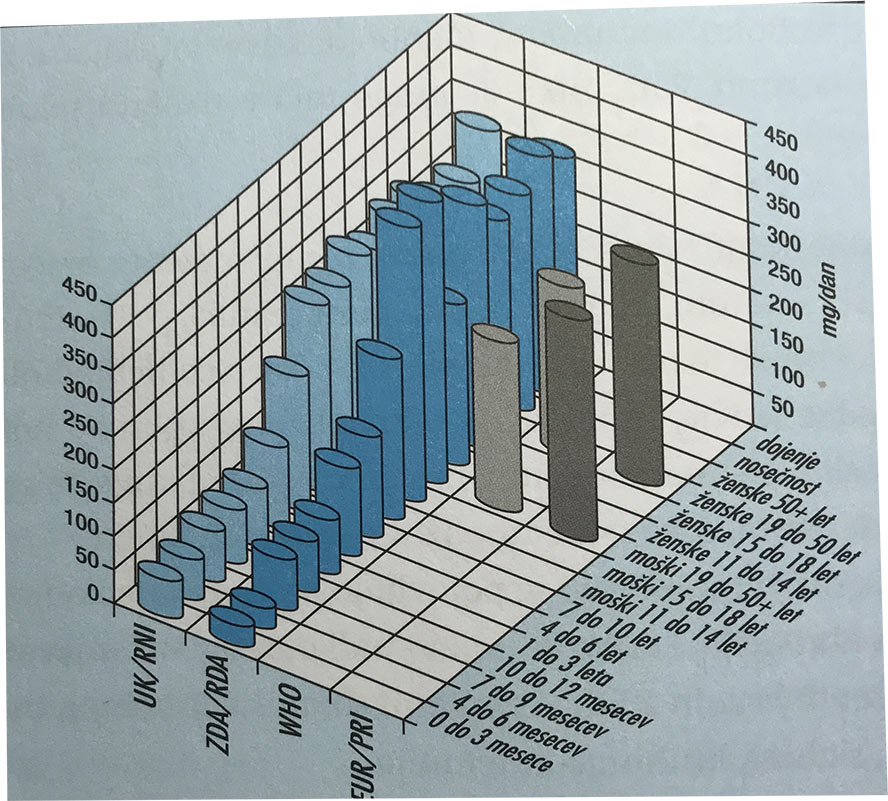
Recommended daily amounts according to age and situation in individual countries of the world.
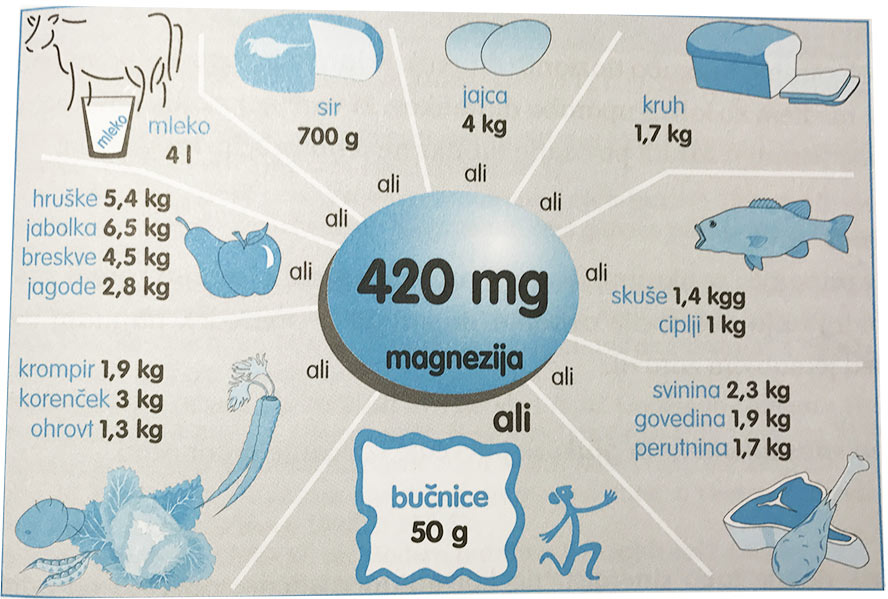
Daily required amounts of food for a healthy adult to ensure that the recommended daily amount is achieved.
Interactions with magnesium ions
Tetracycline antibiotics
Co-administration of tetracycline antibiotics and magnesium can significantly reduce their effectiveness due to the formation of insoluble complexes and thus reduced absorption. To prevent this clinically relevant interaction, separate administration is recommended.
Magnesium-containing antacids and laxatives
Caution should be exercised due to the potential toxicity and occurrence of hypermagnesaemia, especially in patients with renal insufficiency.
Digitalis glycosides
Caution should be exercised in patients treated with digitalis glycosides due to impaired absorption and decreased plasma glycoside concentrations.
Diuretics
Prolonged use of thiozide diuretics may cause hypomagnesaemia, whereas the use of potassium-sparing diuretics may cause hypermagnesaemia due to increased tubular reabsorption of magnesium.
Etidronate
Concomitant use of magnesium and etidronate is not recommended due to a significant reduction in absorption, or an interval of at least two hours between medications is recommended.
Increased alcohol and glucose intake increases magnesium excretion.
Zinc
Zinc acts both synergistically and antagonistically, depending on the dose. Doses greater than 25 mg decrease absorption, lower doses increase it.
Vitamin B6
Vitamin B6 increases the bioavailability of magnesium.
How to solve some health problems by adding magnesium
Magnesium prevents constipation
However, constipation can be prevented or at least considerably alleviated with completely simple measures.
• Eat high-fiber foods (bran, whole grain breads, grains, leafy vegetables, unpeeled potatoes, beans, and dried peas).
• Avoid processed foods such as cheese and white bread.
• Drink at least six to eight glasses of fluid a day, and give up drinks that contain alcohol or caffeine.
• Avoid prolonged use of stimulant laxatives, as the bowel will become sluggish and will no longer function without them.
• Do not ignore the body's urge to defecate, as stagnant stools in the rectum dry out and harden.
• Stool should become part of your daily routine. Always try to discharge at the same time.
• Be physically active for at least some time each day to stimulate the movement of the digestive tract
Use magnesium to prevent constant fatigue
If you feel exhausted most of the time and wake up restless, you are one of many who suffer from the effects of the modern rush of everyday life. There is no specific cure for the phenomenon, called TAIT syndrome in English-speaking countries, in the classical sense of the word, but the addition of magnesium, which permeates energy stores, helps. A balanced diet, eight hours of sleep and time that you will take for yourself every day will definitely help you. The syndrome develops because there is too much of everything in our lives - we burn out due to overwork.
The syndrome mainly affects women who try to take care of children, work, at the same time housework and take care of marital satisfaction. They want to be good in all roles, so it’s no wonder they often become chronically tired.
Chronically tired people often work too much and if they also sleep poorly, the body does not get the opportunity to regenerate. It is therefore crucial that you manage to strike a balance between work and leisure. Sometimes it is helpful to keep a diary about your lifestyle. This will make it easier for you to figure out how much time you actually work, sleep, spend time relaxing and having fun, and change your habits as needed.
Attention: magnesium in the form of magnesium citrate is attached to your order according to your request.
source: vitamins and minerals, truths and prejudices & health guide







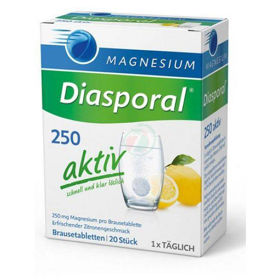
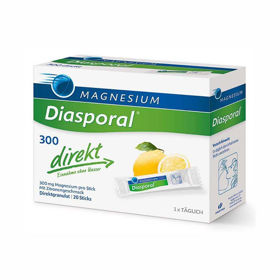
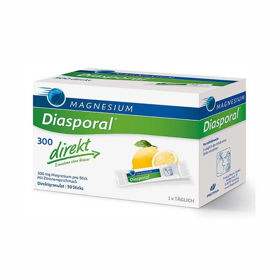
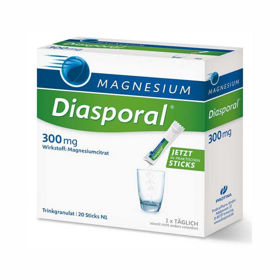

 Facebook
Facebook
 Instagram
Instagram
 info@moja-lekarna.com
info@moja-lekarna.com

